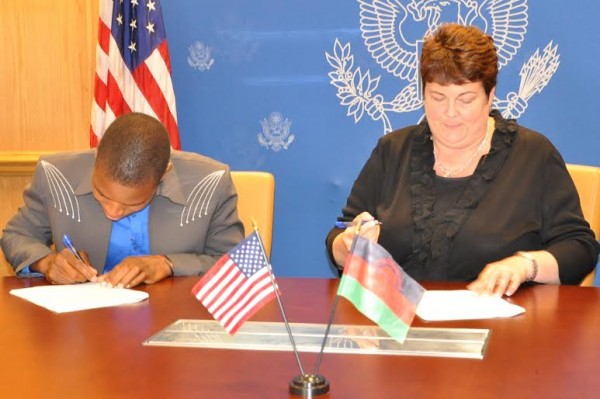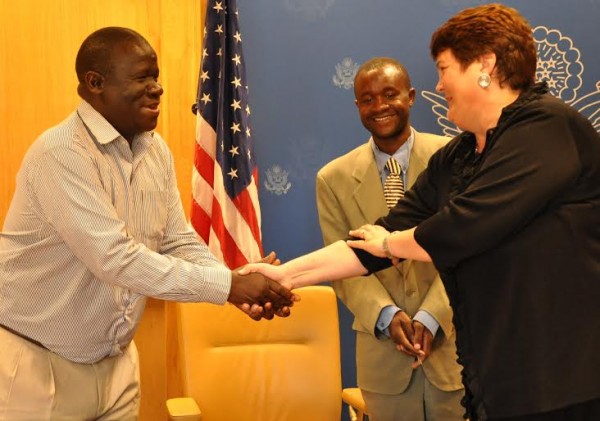![Palmer greeting one beneficiary during self-help grant siging ceremony]()
The United States of America (USA)Embassy in Malawi on Thursday provided grants worth over $ 94 000 (K49 million) to six community groups to support education, health and environment projects in the country.
[caption id="attachment_95740" align="alignright" width="600"]
![Palmer (R) with a beneficiary signing the agreement]()
Palmer (R) with a beneficiary signing the agreement[/caption]
[caption id="attachment_95739" align="alignright" width="600"]
![Palmer greeting one beneficiary during self-help grant siging ceremony]()
Palmer greeting one beneficiary during self-help grant siging ceremony[/caption]
The grants are from the Ambassador’s Self-Help Programme that was announced in August.
USA Ambassador to Malawi Virginia Palmer said over the past five years, the US government, through the African Development Foundation and the Ambassador’s Special Self-Help Programme, has helped 109 locally initiated development projects in Malawi with funding of $610 000 (over K230 million)
“I am particularly pleased that one of the projects being funded today involves construction of school blocks and a girls’ hostel, which will reduce the burden that young girls face in trying to complete secondary school.
“Educating girls in Malawi is not only the right thing to do, but rather good for their families and communities. These girls become productive contributors to the Malawi economy,” said Palmer.
The Ambassador’s Self-Help Fund is designed to support community-driven development projects that address grassroots economic and social problems.
The programme selects projects that have a high-impact, can be quickly implemented, and benefit a large number of people.
Furthermore, the projects are those that have a direct response to the initiative and aspirations of the local community and make income-generating activities possible.
The additional funding amounting to US$42,210 (over MK24 million) will improve education through construction of school blocks and a girls' hostel in Ntchisi, Chitipa, and Rumphi and contribute to increased access to health services by children and women in Chikwawa.
A grant in Mzimba will reduce deforestation through the installation of a biogas digester to use cow dung as a source of fuel to cook meals for children in a community based Child care centre.

 Palmer (R) with a beneficiary signing the agreement[/caption]
[caption id="attachment_95739" align="alignright" width="600"]
Palmer (R) with a beneficiary signing the agreement[/caption]
[caption id="attachment_95739" align="alignright" width="600"] Palmer greeting one beneficiary during self-help grant siging ceremony[/caption]
The grants are from the Ambassador’s Self-Help Programme that was announced in August.
USA Ambassador to Malawi Virginia Palmer said over the past five years, the US government, through the African Development Foundation and the Ambassador’s Special Self-Help Programme, has helped 109 locally initiated development projects in Malawi with funding of $610 000 (over K230 million)
“I am particularly pleased that one of the projects being funded today involves construction of school blocks and a girls’ hostel, which will reduce the burden that young girls face in trying to complete secondary school.
“Educating girls in Malawi is not only the right thing to do, but rather good for their families and communities. These girls become productive contributors to the Malawi economy,” said Palmer.
The Ambassador’s Self-Help Fund is designed to support community-driven development projects that address grassroots economic and social problems.
The programme selects projects that have a high-impact, can be quickly implemented, and benefit a large number of people.
Furthermore, the projects are those that have a direct response to the initiative and aspirations of the local community and make income-generating activities possible.
The additional funding amounting to US$42,210 (over MK24 million) will improve education through construction of school blocks and a girls' hostel in Ntchisi, Chitipa, and Rumphi and contribute to increased access to health services by children and women in Chikwawa.
A grant in Mzimba will reduce deforestation through the installation of a biogas digester to use cow dung as a source of fuel to cook meals for children in a community based Child care centre.
Palmer greeting one beneficiary during self-help grant siging ceremony[/caption]
The grants are from the Ambassador’s Self-Help Programme that was announced in August.
USA Ambassador to Malawi Virginia Palmer said over the past five years, the US government, through the African Development Foundation and the Ambassador’s Special Self-Help Programme, has helped 109 locally initiated development projects in Malawi with funding of $610 000 (over K230 million)
“I am particularly pleased that one of the projects being funded today involves construction of school blocks and a girls’ hostel, which will reduce the burden that young girls face in trying to complete secondary school.
“Educating girls in Malawi is not only the right thing to do, but rather good for their families and communities. These girls become productive contributors to the Malawi economy,” said Palmer.
The Ambassador’s Self-Help Fund is designed to support community-driven development projects that address grassroots economic and social problems.
The programme selects projects that have a high-impact, can be quickly implemented, and benefit a large number of people.
Furthermore, the projects are those that have a direct response to the initiative and aspirations of the local community and make income-generating activities possible.
The additional funding amounting to US$42,210 (over MK24 million) will improve education through construction of school blocks and a girls' hostel in Ntchisi, Chitipa, and Rumphi and contribute to increased access to health services by children and women in Chikwawa.
A grant in Mzimba will reduce deforestation through the installation of a biogas digester to use cow dung as a source of fuel to cook meals for children in a community based Child care centre.